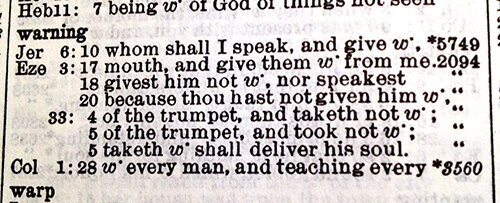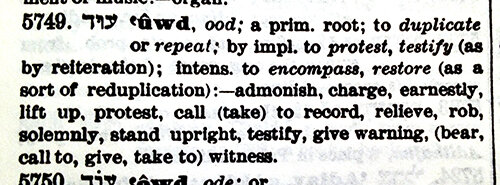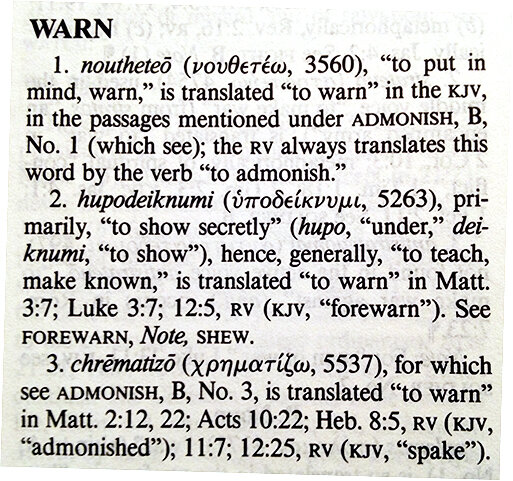There are over 750,000 words in the Bible! We’ve all heard a friend, preacher or teacher mention some phrase from the Bible that we’d like to find and read for ourselves. In a volume as large as the Bible, how does one go about finding the phrase? It’s a lot easier now than it used to be thanks to all sorts of Bible study aids available on the Internet, computers and smart phones. Since you may not always be in a position to use a software tool to do your search, let’s learn how to do it the old fashioned way using a concordance.
What is a Concordance?
A concordance is an alphabetical index of the principal words in a book. Many Bibles have a concordance in the back which provides a convenient way to search for a word you are interested in. These concordances, while helpful, are not exhaustive. That is, they don’t index every single word in the Bible. The “ultimate” concordance is “Strong’s Exhaustive Concordance of the Bible”. It’s important to note that Strong’s is an index of the King James Bible. The translators of the various versions of the Bible frequently use different English words when translating from the original languages than the King James translators chose. As a consequence, if you attempt to look up a word in Strong’s that you remember being read from the NIV, NKJV, or some other translation, you may not find what you are looking for.
How to Use a Concordance
Let’s say you wanted to find every occurrence of the word “warning” in the Bible. Concordances list words alphabetically so just go to the “W’s” and locate “warning” in Strong’s. You’ll find an entry that looks like this:

Strongs-warned-500As you can see, the word “warning” appears in only eight verses in the entire King James Bible. On the left are the books, chapters and verses where the word can be found, in the middle is a snippet of the verse. In the snippet, the letter “w” in italics appears instead of the word itself to save space. On the right are numbers which are referred to as “Strong’s Numbers”. This numbering system is extremely helpful.
Why are Strong’s Numbers Helpful?
Strong’s assigns each root word of the original language a number that helps those of us who aren’t familiar with the ancient languages. In the example above, we can see that the word translated as “warning” in Jeremiah 6:10 is assigned number 5749. However, in Ezekiel 3:17 (and the following verses in Ezekiel) the word translated “warning” comes from a different Hebrew word with Strong’s number 2094. Two different Hebrew words (the original language of the Old Testament) were both translated into a single English word.
In the back of Strong’s Concordance are two dictionaries – one for Hebrew words found in the Old Testament and the other for Greek words found in the New Testament. Unlike a normal dictionary where the words are listed in alphabetical order, the Strong’s dictionary is listed in the numerical order of the Strong’s numbering system. This makes it a snap to find the definition of the Hebrew word “5749” which is “uwd”.

You could then look up Strong’s 2094 in the Hebrew dictionary and see that the two Hebrew words convey slightly different meanings. Comparing words in this way can in some cases provide valuable insight into a passage of scripture that might not be apparent when only looking at the English translation.
Don’t Get the Numbers Mixed Up
It’s important to be aware that the Strong’s numbers begin at “1” in both the Hebrew and Greek dictionaries. Continuing to use the example of the word “warning”, notice that the last entry is Colossians 1:28 and the Strong’s number is 3560. Since the book of Colossians is in the New Testament you must look up this number in the Greek dictionary. Once there you’ll see the Greek word “noutheteo” along with its definition.

If you had looked up 3560 in the Hebrew dictionary you’d find a number match, but it would have been the wrong word. Just remember that Strong’s numbers for Old Testament words are found in the Strong’s Hebrew dictionary, numbers for New Testament words are found in the Strong’s Greek dictionary. Sometimes the numbers are differentiated by placing an H[ebrew] or G[reek] in front of the numbers: H5749, G3560.
Don’t Be Intimidated
If you feel that all of this is a bit overwhelming, don’t sweat it. Once you’ve used Strong’s a few times you will find that it is actually a very simple and indispensable tool. You’ll be a pro in no time. Once you understand how to do look ups with a hard copy concordance, it will be even easier to use online Bible study aids.
